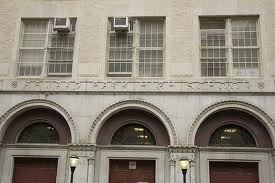Seward Park High School was a large, five story building. In the basement it had two swimming pools, one for boys and one for girls. The roof was a fenced in play area, mostly for handball, which could be and was accessed from the cafeteria during lunch hours. Besides the cafeteria there were also two gyms on that floor, as well as the orchestra’s large practice room. On floors one through four were the classrooms and offices. In those days, at the entrance to the building, there were no metal detectors, no security guards, and most emphatically, no policemen. Police presence would have been considered a threat to academic freedom. The teachers were the authorities, and no one even thought of challenging that authority. There were rules, of course, but these were enforced by a “patrol” of student monitors, who sat at either end of the long corridors and made sure no one was wandering around when they should have been in class, and normally these monitors had nothing to do but check “passes” and homework. Their “work” was considered service credit, and it filled a “study” period.
There were also student “monitors” assigned to each of the offices, and I was most fortunate in being assigned to the office of the improbably named Alfred Tennyson Vogel, the chairman of the English Department. Mr. Vogel was a tall, gangly man, somewhere between thirty-five and forty-five years of age, with thinning, straight dark hair, who always wore three piece suits and bow ties. As chairman of the English Department, he was also in charge of the bookroom, which meant that he was responsible for checking books out and in, and for repairing damaged books, all tasks he quickly taught the students assigned to his office. I enjoyed the bookroom, as I enjoyed repairing the book bindings, at which I became quite proficient, and better still, got to read the books that many students dreaded. Naturally, by this time I spoke English, a transformation which had taken place very quickly, as if I’d spoken it in a previous life.
When not working in the bookroom, I worked in his office, usually in the company of another student, and our job consisted of mimeographing tests or forms needed by teachers, or collecting money and keeping records for the paperbacks available for sale in two of the file cabinets in the office. I loved those paperbacks, most of whose titles I don’t remember; however, I also remember being carried away to Shangri La, in James Hilton’s “Lost Horizon,” and to an exploration of love in Thornton Wilder’s “The Bridge of San Luis Rey.” Not all the books were that serious, as we also had Bennett Cerf and Max Brand in the cabinets, as well as some science fiction and a poetry anthology by Louis Untermeyer.
One day, Mr. Vogel walked into his office as the girl monitor (whose name I’ve forgotten) and I were very seriously reading some lovely, mushy poems to one another, completely unaware of how this might be interpreted. We were excited by what we were discovering in Untermyer’s anthology, and it was a great moment for both of us. Mr. Alfred Tennyson Vogel, Chairman of the English Department, was, of course, delighted. This was education!



Have you read the book Love That Dog? It has been a great introduction to poetry for my kids. Really sweet.
Nope. Untermyer’s anthology was not that kind of thing. Both of his anthologies are still used at many colleges today. By-the-way, I did send Isabel a poem yesterday (The Owl Critic), but I don’t know whether she read it or even got it, as she never responds to my e-mails. It is both funny and wise. The poem can be found by Googling it.
A.